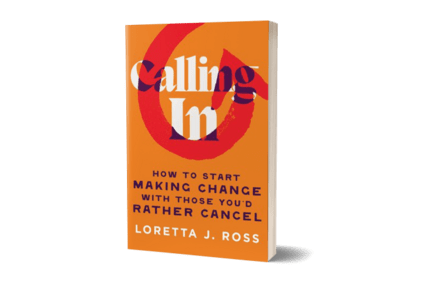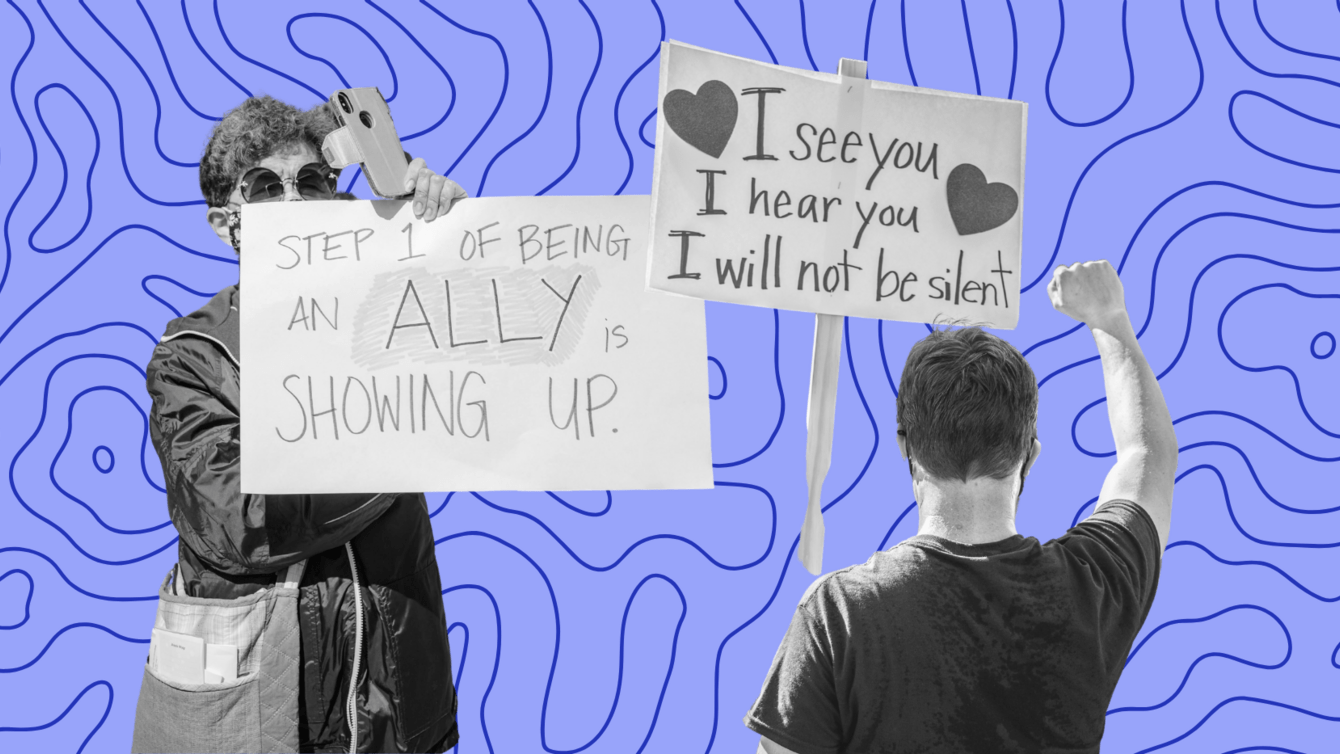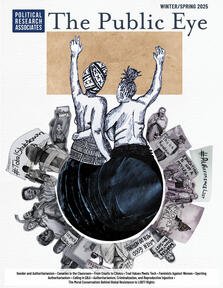In a time of heightened political polarization and violence, Loretta Ross offers a transformative framework for addressing conflict within and beyond social justice movements. In Calling In: How to Start Making Change with Those You’d Rather Cancel (Simon & Schuster, 2025) Ross introduces the concept of “calling in” as a compassionate alternative and response to callouts and cancel culture. She draws on five decades of movement work, opposition research, and lived experience to present the interpersonal struggles and hard-won lessons that have shaped her belief in a framework rooted in transformative justice. For Ross, calling in is not about avoiding accountability. It is a commitment to meaningful change that involves seeing people’s complexities so that we don’t reduce them to their worst actions. Calling in, as Ross describes it, is “a call out done with love.”[1]
Calling In is a call to action and a reflection on how we can all navigate harm, foster solidarity, and embrace a deeper commitment to joy and belonging. Ross’s insights challenge activists to move beyond the fleeting gratification of calling out—a tactic that, while emotionally satisfying in the short term, can ultimately destroy movements and interpersonal relationships. Instead, she advocates for building irresistible movements that embrace complexity, growth, and connection.
Ross sat down with PRA to reflect on her journey through a lifetime of activism, including her work to dismantle Both a system of beliefs that holds that White people are intrinsically superior and a system of institutional arrangements that favors White people as a group. Learn more , advocate for gender and reproductive justice, and fight for human rights for all. By reframing identity-based struggles as part of a broader human rights movement, Ross provides a vision for connecting and sustaining resistance in the face of A form of top-down political system that concentrates state power in the hands of a single leader and/or group of close allies. Learn more and division.

Calling In: How to Start Making Change With Those You’d Rather Cancel (Simon & Schuster, 2025)
PRA: Your book introduces the concept of “calling in” as part of a five-part continuum for addressing conflict: canceling, calling out, calling the conversation off, calling on, and calling in. For readers new to this framework, can you explain what “calling in” means and how it works as a tool for creating meaningful change within ourselves and our communities?
Loretta Ross: Calling in, as a concept, was coined in 2013 by a then 18-year-old, Loan Tran. They attended a racial justice conference that was dominated by people calling each other out. Frustrated, they wrote a blog post critiquing callouts,[2] but the backlash was so intense they never revisited it. While researching my book, I found the blog and reached out to them. When I asked why they didn’t pursue it further, they said, “I didn’t feel like taking on the whole world by myself.”
Calling in is an accountability process to help others and ourselves grow by engaging in constructive versus destructive conversations. As I wrote in my book, the first person to call in is yourself, so that you don’t overreact or walk around looking for a fight because of past harm. As others have said: Don’t let your past sabotage your future.
Calling in is a callout, but instead of using anger, blaming, and shaming, you use love and respect because that reflects who you are inside and who you aspire to be. Calling in achieves what callouts don’t: a chance to figure out how to work better together. Calling people out invites a fight, not collaboration. If you want people to be more effective together, calling in increases the likelihood you’ll figure out how to get along.
”Calling in is an accountability process to help others and ourselves grow by engaging in constructive versus destructive conversations.”
When is calling in most effective for addressing harm? On the flip side, are there times when calling out is warranted?
Oh yeah! When people have had a chance to change and choose not to, continuing to abuse power, gaslight, troll, act like a nazi, calling out is appropriate. They’re not interested in collaboration; they’re only interested in humiliation, shame, and power over people. Calling out is a tactic of last resort, not first. You can try talking to people or finding messengers they might listen to before resorting to a callout.
Calling in is most effective when you’ve done your own mental preparation. If you’re still wounded from unhealed trauma, whether you call in or out, the result will be the same: you’ll bleed all over them. That’s why calling yourself in is so important. One way I put it is, “Why are you handing the remote control to your emotions off to someone else? They may change it to a channel you don’t want!”
”Until I started doing anti-fascist work, I was motivated by rage at injustices, which led me to have contempt for those who committed them.”
You talk about your work with Leonard Zeskind and the late Reverend C.T. Vivian at the Center for Democratic Renewal “deprogramming White supremacists” like Floyd Cochran, the former Aryan Nation spokesperson and recruiter. What did your experience working to fight the Right (as an oppo researcher) teach you about calling in?
Until I started doing anti-fascist work, I was motivated by rage at injustices, which led me to have contempt for those who committed them. It didn’t create space for seeing them as complex people. Then Reverend Vivian told me, “When you ask people to give up hate, you need to be there for them when they do.”[3] My first response was, “Oh, shit. I don’t want to hear that.” Of course, I said that under my breath because you can’t say that to a preacher. But that’s how I felt. But he wasn’t saying to “turn the other cheek.” He was saying I was approaching the work with anger and rage in my heart, which isn’t the way to do the work or embrace nonviolence. Like Nelson Mandela reportedly said, “Hate is like drinking poison and expecting the other person to die.”
Eventually, I decided to do something else. Getting to know people like Ken Petersen and Floyd Cochran helped me humanize them. Once I saw their complexities, I couldn’t hate them anymore.
“The Right only has two things going for itself: lies and violence.”
In the book, you point out the Right’s attempts to claim victimhood by talking about the destructive nature of cancel culture, saying that it’s a hypocritical attempt to deflect accountability as they’re actively threatening the rights of vulnerable populations. At the same time, you explore critiques of calling out and caution that calling out in movement spaces under the wrong circumstances airs our dirty laundry for opponents to use against us. How do you distinguish valid concerns about callouts from the Right’s opportunistic critiques of cancel culture?
The way I see it, the Right only has two things going for itself: lies and violence. When they try to assume the mantle of being society’s perpetual victims, I point out their lies and hypocrisy. That’s necessary to deconstruct how they’re manipulating people and their pains. They’re good at giving the appearance of taking people’s suffering seriously when they really don’t.
I have no problem critiquing the Right’s attempts to manipulate our good hearts, to make us feel sorry for them when they’re doing all the damage they can. They talk about being canceled, but as the book says, they’re the ones banning books, jobs, critical race theory, gender pronouns, and anything else they can label “woke.” Anything they attach that label to, they want to ban. That hypocrisy can always be pointed out. At the same time, we shouldn’t go around making the world crueler than it needs to be. We can’t become what we’re fighting.
”Calling out assumes you already know everything you need to know, which isn’t true or desirable.”
You said in the book that we can’t berate people into joining our side. Because why would they want to if that’s how we handle conflict?
People don’t need help feeling worse about themselves. They can do that on their own. If we want them to join the struggle for justice and human rights, we’ve got to make them feel they belong to something significant—that we accept them and their imperfections. And we shouldn’t criticize them for their learning curve when we’re on our own. Toni Cade Bambara said, “We have to make the revolution irresistible.” That’s done through joy, fulfillment, and belonging, not by excoriating people for not knowing everything they should know at any moment. Calling out assumes you already know everything you need to know, which isn’t true or desirable.
”The post-Dobbs landscape is different in many ways but in some ways it’s same old, same old. It’s still the most vulnerable who are harmed.”
As you’ve said, calling out can be a powerful tool for oppressed people. But when we wield it against each other, the outcome isn’t the same.
We’re destroying our capacity to build power to make change and stop human rights violations, which is frustrating to me as a progressive activist. When I think about the recent election, pundit after pundit, almost always White, has been talking about what the Democrats did wrong. I’m like, wait a moment, haven’t y’all figured out it’s what the White supremacists did right? The only identity politics that matter to them are their White identities. It ain’t about the economy, immigrants, or women. It’s about Whiteness, and they will offer every critique and excuse in the world instead of naming the White supremacy that’s in the United States’ DNA. Their failure to critique it is why they can’t offer a sturdy or thorough analysis of Trumpism.
We’re 30 years on from the coining of the term reproductive justice in 1994, during a very different social and political moment.[4] In recent years, we’ve seen the fall of Roe, intensified political polarization and violence, and the rise of Donald Trump. How has this changed landscape shifted the reproductive justice movement’s current priorities and strategies?
Since reproductive justice was created by Black women, we’ve always known we couldn’t count on legislators or the courts for our liberation. That’s why we took a human rights-based approach to articulate what we deserve and are fighting for. What’s added to our burden is allies who thought they were protected by the legal system. They felt most betrayed when [Roe] was reversed. The post-Dobbs landscape is different in many ways but in some ways it’s same old, same old. It’s still the most vulnerable who are harmed. We must focus on those who won’t receive information about options like traveling to another state or taking abortion pills, as the first move will be to suppress information and instill fear. Even billionaires like Jeff Bezos think that appeasing fascists will protect them, echoing the mistakes of Nazi Germany’s corporate leaders who thought they could control Hitler but ended up controlled by him.
Reproductive justice must move beyond the limits of the U.S. jurisprudence and constitutional system to international human rights norms, laws, and treaties. I’ve been advocating since the attack on DEI and CRT that we should reframe our work as human rights work. It reduces their ability to attack us through identity-based critiques. Calling it a human rights movement combines our issues and forces them to explain why they oppose human rights—which, by definition, includes everyone.
”We don’t all have to work on the same things with the same intensity, but we should do our work in ways that don’t create contradictions for the same movement.”
What strategies can the RJ movement develop to center collective goals and solidarity while navigating the diverse priorities and perspectives within our movement spaces?
The first thing we need to do is stop offering ideological litmus tests. “If you don’t support this, then I can’t work with you. “If you don’t say this in this way, I can’t work with you.” To me, that’s when your callout is more about [individual] power than purpose. You want the power to tell everybody else what they should do, believe, and think, but you’d hate for that power to be imposed on you.
My bottom line might be I care more about abortion, someone else cares more about climate change, and another person cares more about gun control. We don’t all have to work on the same things with the same intensity, but we should do our work in ways that don’t create contradictions for the same movement. I can’t work for trans rights in a misogynistic way, or Black rights in a homophobic way, without undermining my own movement. It’s about how we do the work more than the issue we focus on.
You started each chapter with an epigraph, and the Epilogue’s quote is from Howard Thurman: “Don’t ask what the world needs. Ask what makes you come alive and go do it, because what the world needs is people who have come alive.” What about calling in and your journey to this framework makes you come alive? And how can others find what makes them come alive in service to themselves and our movements for justice?
When I discovered the urgency of addressing callout culture, I felt I’d been given a new mission towards the end of my life. I’d worked in violence against women, anti-apartheid movements, and many other issue-based movements. Over the years, I saw activists dealing with the same self-destructive tendencies that I saw while organizing in the 1970s. That gave me an opportunity to write what I call an intellectual biography, and say, “Wait, we’ve been through this before. I’ve been through this before. Let me show you what I’ve learned from it.” It’s given a new focus for my end-stage activism.
To paraphrase Alicia Garza, a Black Lives Matter movement co-founder, who says it best: I’m so ready for us to make new mistakes, not to keep making the same old ones.[5] I want us to learn from our old mistakes, so that at least we give ourselves the opportunity to make new ones!
- Endnotes
- Loretta Ross, Calling In: How to Start Making Change with Those You’d Rather Cancel, ed. Megan Hogan (New York: Simon & Schuster, 2025), 26.
- Ngọc Loan Trần, “Calling IN: A Less Disposable Way of Holding Each Other Accountable,” BGD, December 18, 2013, https://www.bgdblog.org/2013/12/calling-less-disposable-way-holding-acc….
- Ross, Calling In, 113.
- “Reproductive Justice,” In Our Own Voice: National Black Women’s Reproductive Justice Agenda, accessed January 10, 2025, https://blackrj.org/our-causes/reproductive-justice/.
- Alicia Garza, “Imposter Syndrome and the A system of social control characterized by rigid enforcement of binary sex and gender roles. Learn more ” in The Purpose of Power: How We Come Together When We Fall Apart (New York: One World), 17, 203.


